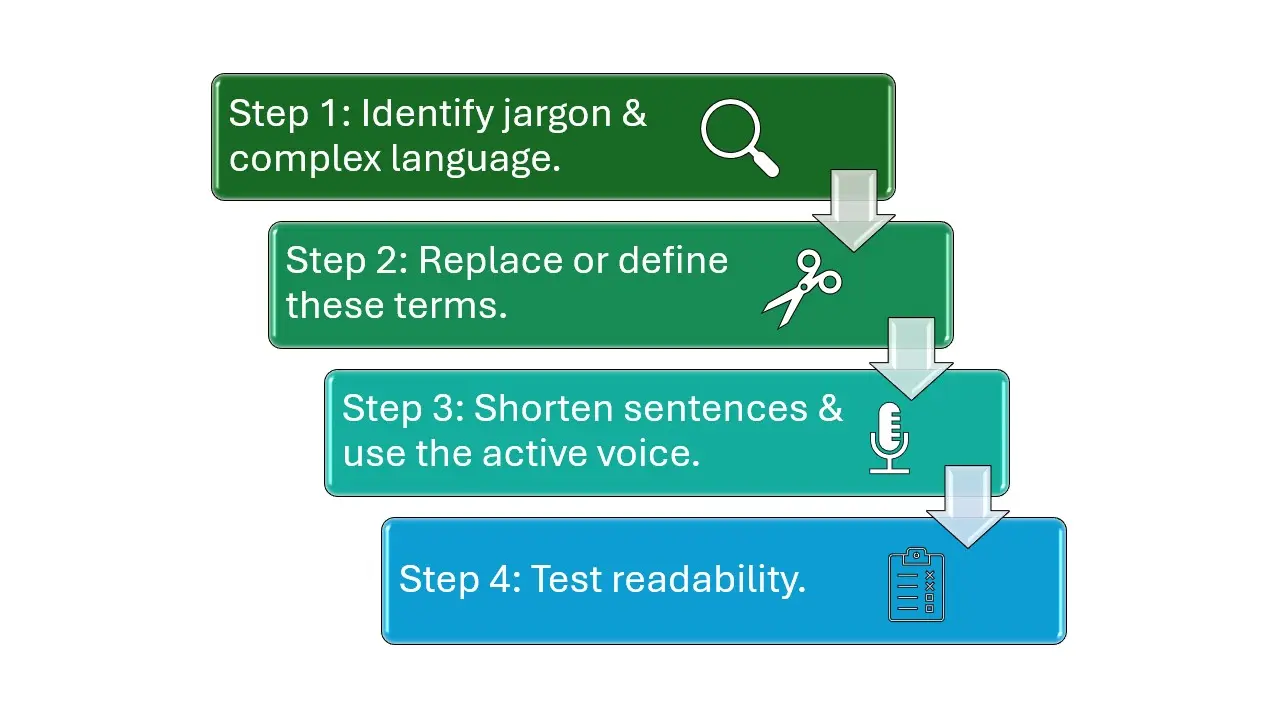Blog • Posted on Dec 5, 2024
How to Reduce Jargon and Complex Language in Scientific Writing
Writing for an academic audience doesn’t mean burying your message under layers of dense language and technical jargon.
The most impactful research papers are clear, concise, and accessible.
In this article, I’ll share strategies to simplify complex language, supported by examples of clear, jargon-free scientific writing.
Let’s get into it!
Key Takeaways
- Avoid unnecessary jargon and overly complex phrasing to increase the clarity and impact of your paper.
- Replace technical terms with simpler alternatives whenever possible, but retain essential precision.
- Adopt techniques like defining terms, using plain language, and favoring active voice to improve readability.
Table of Contents
Why Reducing Jargon Matters
Scientific writing isn’t just about reporting your findings; it’s about communicating it effectively.
While field-specific terms are sometimes necessary, excessive jargon can alienate readers, muddy your message, and reduce the overall impact of your research.
Even seasoned academics prefer clear writing, and many journals now prioritize accessibility - so don’t ignore it.
By reducing jargon, you:
- Broaden your paper’s audience
- Increase citations and reach
- Strengthen your core argument

See How We Can Help You Publish High Impact Easier Than Ever
- Mentoring - real meetings. Real results.
- Professional Editing - our team of former journal editors will get your manuscript publication-ready.
- Online Courses - learn invaluable presenting & writing skills.
What Is Jargon?
Jargon refers to highly specialized language that is difficult for readers outside a specific field to understand.
While technical terms are sometimes needed for accuracy, jargon often includes:
- Overly complex words or phrases
- Acronyms that aren’t defined
- Unnecessary use of field-specific slang
Example of Jargon:
“The synergistic interaction between xenobiotic compounds potentiates adverse outcomes in aquatic ecosystems.”
Simplified Version:
“The interaction between foreign chemicals increases harmful effects in aquatic ecosystems.”
When including any of the above in your writing, try asking yourself: “is this term necessary to understand my message?”
If it isn’t, you’re probably better off leaving it out.
The Problem with Complex Language in Research Papers
Complex language creates several barriers for readers:
- Limited accessibility: Even professionals within your field may struggle to understand unnecessarily dense writing.
- Reader fatigue: Long, convoluted sentences can make papers harder to follow.
- Lost impact: If your core message is buried in jargon, readers may overlook your findings altogether.
To maximize your paper’s impact, aim for clarity and simplicity.
The best way to think about it is like this.
There is a clean, unobscured storyline in your paper.
Every piece of unnecessary, complex language you add dirties your message and distracts from the central story.
Also, your goal should never be to impress the reader. Jargon actually does the opposite!
Readers appreciate an unadulterated story with simple questions, clear answers, and an easy take-home message.
Write with the reader in mind and you’ll have them on your side in no time (by the way, the same goes for the reviewers!).
By the way, if you struggle with paper writing, you can get daily tips straight from me to your inbox here (it's completely free).
Practical Tips to Simplify Your Writing

Tip #1: Define Specialized Terms Clearly
It’s tempting to assume your audience knows every technical term, but even experts benefit from clear definitions.
- Define key terms the first time you use them.
- Include a glossary if your paper uses many technical terms.
- Avoid assuming familiarity with niche acronyms.
Review papers typically have a glossary for niche terms and acronyms to help with readability.
For example, instead of:
“Participants underwent an EEG during REM sleep.”
Write:
“Participants underwent an electroencephalogram (EEG), which measures brain activity, during the rapid eye movement (REM) stage of sleep.”
Tip #2: Replace Jargon with Plain Language
Whenever possible, use simpler alternatives to technical terms.
Jargon: "Utilize"
Plain Language: "Use"
Jargon: "Ameliorate"
Plain Language: "Improve"
Jargon: "Demonstrate efficacy"
Plain Language: "Works effectively"
Plain language doesn’t mean “dumbing down” your work. It means making it easier for readers to engage with your ideas - which is the goal, by the way!
Tip #3: Use Shorter Sentences and Active Voice
Long, passive sentences make your writing more difficult to read.
That’s because the passive voice misplaces the emphasis on the action or the object experiencing the action.
Contrastingly, the active voice emphasizes the subject and typically results in shorter sentences.
Passive voice:
“The experiment was conducted by the researchers to test the hypothesis.”
Active voice:
“We conducted the experiment to test the hypothesis.”
Shorter sentences also improve flow and readability.
Break up complex ideas into bite-sized pieces.
Plot twist: I’m doing it right now.
Tip #4: Avoid Overuse of Acronyms
Acronyms are a useful shorthand but can overwhelm readers if overused or undefined.
- Define acronyms the first time you introduce them.
- Avoid introducing too many acronyms in a single section.
For example, instead of:
“The EBI, along with SRT, was correlated with high CSR during REM.”
Write:
“The external biomarker index (EBI), along with the sleep response threshold (SRT), was correlated with high circadian sleep regulation (CSR) during REM sleep.”
Tip #5: Test Your Writing’s Readability
Easily the best way to test your writing’s readability is to read it aloud.
It’s also free!
If you find yourself struggling to read your sentences aloud, they’re probably too complex for the average reader.
You can test your writing's readability using an AI tool like Hemmingway Editor.
Additionally, you should ask a colleague from another field to review your paper.
If they struggle to understand your key points, consider revising.
Examples of Simplified Language in Scientific Writing
It doesn't take a lot to simplify scientific writing. Just try to imagine you're talking to a friend at the bar.
Here are a few quick examples:
Before: "The results unequivocally substantiate the hypothesis."
After: "The results clearly support the hypothesis.""
Before: "The methodology employed facilitated the acquisition of data.""
After: "The method allowed us to collect data.""
Before: "The current paradigm in ecological research elucidates..."
After: "Current ecological research shows..."
FAQs
Is it okay to use some jargon in scientific writing?
Yes, but only when the terms are necessary for accuracy. Ensure all jargon is defined clearly.
Won’t simplifying my writing make it seem less academic?
Not at all! Simplified writing increases clarity and impact. Journals value accessible research.
What if I can’t avoid using technical terms?
If technical terms are essential, define them concisely and ensure they’re used consistently throughout your paper. A common mistake is to alternate between synonyms of the same term, forcing the reader to juggle terms while trying to distill your core message. Keep it simple and your readers will thank you.
What is the difference between passive and active voice?
When using the active voice, the subject performing the action is at the front of the sentence. In contrast, the passive voice emphasizes the action or the object experiencing the action, often leaving the subject to the back or omitting it entirely.
For example, "the researcher analyzed the data" is
written in the active voice, as opposed to
"the data was analyzed by the researcher", which is
written in the passive voice.
Conclusion
Reducing jargon and simplifying complex language doesn’t just make your paper easier to read. It also ensures your research has the impact it deserves.
By adopting plain language, clear definitions, and concise phrasing, you’ll write papers that engage readers across disciplines.
Want expert help refining your scientific writing? Our team of experienced editors can help you eliminate jargon and maximize clarity without compromising precision.
Dr. Matt Biddick is a Senior Editor & Academic Mentor at RURU. Book a free 1:1 session with him here.


